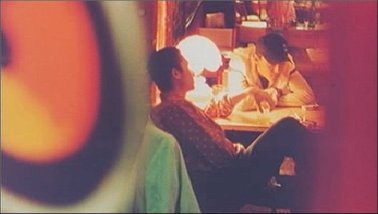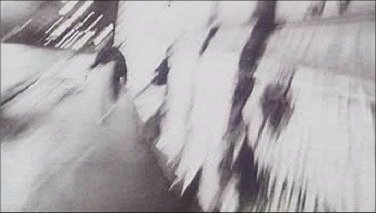|
Text and layout © Ed Shum, 2003. Ed Shum asserts the moral right to be identified as the author of this work |
|
Long Reviews |
|
Chang Chen, as has been said, is carefree and almost over-real. We don’t delve too deep into latent pains (his hinted at family problems seem all sewn up at the end of the film - a simpler template than Tony’s), or in any case, he lets little plague him to existential despair. Like Faye Wong, or for that matter, Jacky Cheung in Ashes, he is the paradigmatic opposite of the paralysed mourners who are often at the centre of WKW’s narratives. This creates a dichotomy which results in desirability (Faye is the ‘difference’ which a day can make in Tony’s insular life) as well as unreachability: a re-evaluation of the position of the self (as Leslie realises that he can never do as Jacky does in Ashes, he feels envy). These concepts are evoked and - in classic WKW fashion - not brought to oppressive conclusion, in that we don’t ever know if Chang is ‘right’ for Tony (we only have the symptoms of warmth which come from the solace he finds - much like the determinedly impermanent union of Michelle and Takeshi at the end of Fallen Angels), and the end has Tony temporarily settling for a stolen photograph of Chang rather than show them meeting on a bilateral basis. |
|
Review of Happy Together (1997) |
|
|
|
...Continued... [Page 6] |
|
End |
|
It is telling, and also patently ambiguous, when Tony says that he will ‘know where to find him’ after taking the photo - this refers to both Chang’s real location; his ‘roots’ now he has returned home, as well as the image in the photograph which is a signifier of the person, or the memory one has of the person. In terms of narrative potentiality, this signals the possibility of a ‘reunion’ to add to all the others, or it may be a recognition that Tony realises the perfection of the unfulfilled - another ‘happiest’ time together which would be sullied by attempting to bring it to fruition. Again, desirability goes hand in hand with unattainability. This is an excellent example of the manner in which WKW can evoke two different possibilities keeping both valid and potential. |
|
Where does Happy Together stand then, when viewed against WKW’s other work? On the one hand, the characters are still offbeat misfits, not the older, strait laced suits of ITMFL. Yet there is a sense of relocation: Tony does make the move back home - WKW characters are often in a wilderness, and so this move is rare (though it is evoked by epigram in Ashes). The family theme is alternately present or conspicuously absent in WKW’s films, and one may note that there are no definitive bonds of family in the sense of backstory in ITMFL and Chungking, yet the theme is apparent in Days, Fallen Angels and Happy Together. On one viewing, Happy Together may appear quite conservative in that homosexuality is not the dominant theme as the film brings itself to conclusion, although WKW could also be praised for not running the issue to predictability. |
|
The film is also very sad. This foreshadows WKW’s move away from relying on exhilaration, although the final portion of the film is a sweet reminder of how WKW can render uplifting yet ambiguous hope. There is also less reliance on the philosophical/cryptic voiceover - another move towards ITMFL. In the end, WKW stays true to his core mode of expression in following a central character, never straying far from his viewpoint or the perceived viewpoint of others of him. We learn from this character all emotions: love, envy, pain, loneliness, hope, and we see how they have affected others. For Happy Together, most of the emotions are negative, as it is hard to understand the core relationship in the story because of Leslie’s outrageousness. Yet WKW avoids the reportedly mooted idea of ending the film with a suicide, which would have been the definitive ‘no way out’ scenario (arguably demonstrated by Leon’s character in Fallen Angels) - and would have caused overly tendencious ‘1997’ readings. |
|
This ‘1997 film’, ‘gay film’, ‘art film’ has a habit of wrong-footing anyone who comes with preconceptions; expectations. On the handover, WKW has taken a deliberately distanced view: out of Hong Kong, avoiding clear projection of what will occur for the city. The death of Deng Xiaoping is both a beginning and an end: the end of an ‘old guard’ China which the rest of the world was not privy to, and the beginning of modernity - the econo-centric culture which Deng espoused brought to fruition by the (arranged) marriage of changing China with the always-changing, paradigm of Capitalism, Hong Kong. Yet WKW gives blank comment on how such a union will change China or Hong Kong. The death of Deng is just another inevitable event, just like the handover. |
|
Message in a bottle: the time Tony spends with Chang isn’t overtly happy, yet there is a soothing sense of incongruity compared to his fiery intimacy with Leslie. WKW leaves the end open giving us the feel of potentiality and possibility over fruition and destination |
|
On homosexuality, the filmmaker must pick and choose facets to portray. One might view Leslie’s tantrums and Tony’s seething violence as over the top, except both actors are being asked to explore something within themselves - especially in the case of Leslie, one of the very few openly gay Hong Kong celebrities. In the end, WKW loves the dysfunctional relationship, whether straight or homosexual. That the film uses common preconceptions about homosexuality - cruising, anonymity, prostitution, violent encounters - says as much about the culture’s status as a still largely taboo subculture as it does about the filmmaker’s understanding. The result is inevitable depictions of anonymous street encounters, illicit transactions, a ‘hidden’ world. In fact, against this backdrop the core relationship must be even more precious - an oasis of mutuality in a sea of chance. No, WKW doesn’t show a ‘perfect’ understanding of homosexuality - but he shows the preciousness of human connection. |
|
In one scene, Tony’s Buenos Aires cruising scene, it appears as though homosexuality is the norm. Yet this is only one moment, pieced from selected moments, where people don’t need to ask about sexuality, or to hide. In the end, Happy Together is not a movie which attempts to show a cultural advance - homosexuality doesn’t ‘become’ the film, it is merely a backdrop, albeit a very interesting one which earned the film a mainstream-unfriendly Category III rating in Hong Kong, as well as international arthouse interest. |
|
Frenzy: one of the most interesting things I’ve heard said about WKW’s films is that, when one looks back, the core thing that can be said to have happened in them is that ‘the characters felt intensely’ (Alice Addison - Plastic Melancholy), and matters of narrative, or even subtext and ‘meaning’, are peripheral. I.e. it is emotion which defines WKW’s films (and how they are appreciated) more than any overarching ‘purposes’ |
|
And on the ‘art’ label which the style and subject seem to invite, WKW plays with such a perception using the tropes of art film as genre: black and white, different film stocks, self-conscious changes in how film recreates light and sound, distilled emotional ellipsis and enlightenment. Yet these mannerisms - WKW at his most dazzling and immediately noticeable - are more than blank suggestion, they actually contribute to the film itself rather than its genre or categorisation. To this end, the question of what is art seems sidelined - just as WKW seems hard to pigeonhole by genre, a label of worthiness like ‘art’ would also say very little about the film itself. |
|
I like this film. It grew on me during the second half when I left behind ideas of how WKW might ‘handle’ the story. I should already have known that such expectation was unnecessary, irrelevant even. This is a film which is at once rooted in context - the point WKW reached as a filmmaker, public perception, politics, cultures - yet it is also a film of primary emotions that reach out and move. That is the one thing that matters, and the one thing you can expect from a WKW film. |
|
Page: |
|
Page: |

